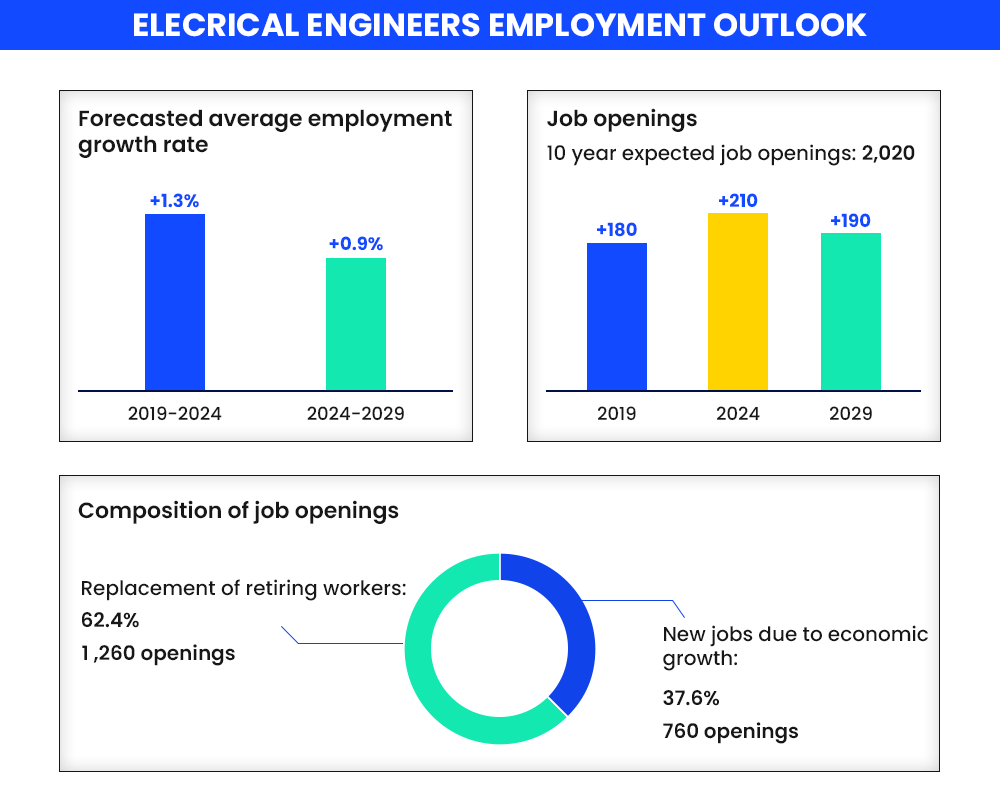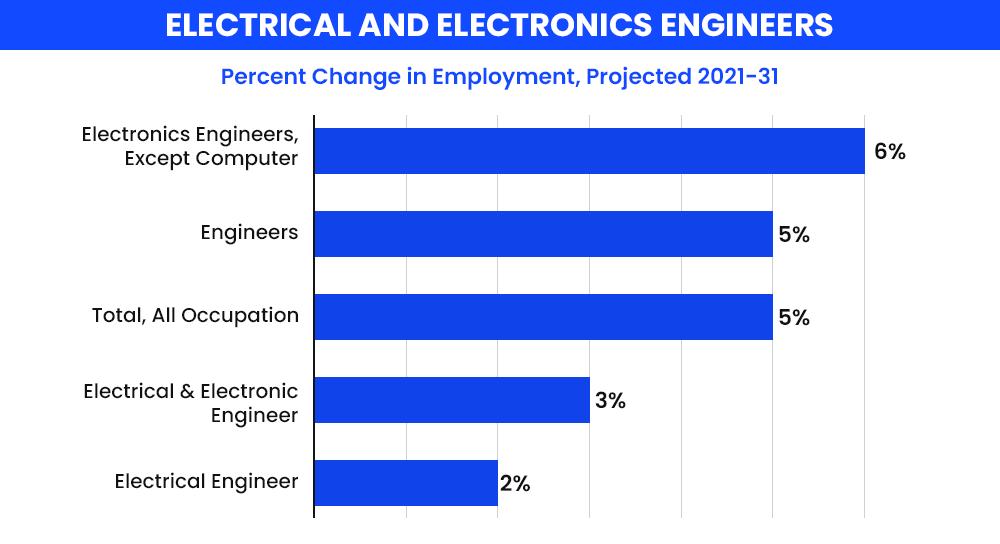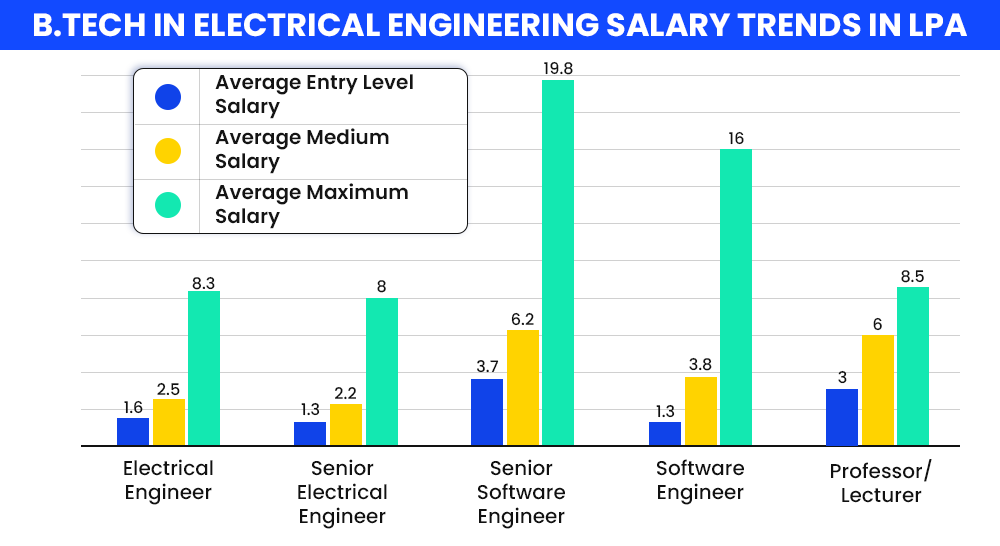Expert Interviews
- University Reviews
- Career Guide
 Video Counseling
Video CounselingImportant Facts
- Ask any Question - CV Forum

B.Tech Electrical Engineering Syllabus 2026 [List of Subjects]
Shalini Adhana Jan 10, 2026 1.8K Reads

Electrical engineering is one of the oldest branches of engineering and continues to be the top preferred branch of engineering among engineers.
The electrical engineer's role is to make the most use of electricity and develop technologies around it for industries like construction, robotics, and healthcare.
The BTech Electrical Engineering syllabus deals with electronics and electricals and focuses on electricity, its fundamentals, electromagnetism, and electronics. The aim of the course is to make learners understand the design and applications of electricity and electromagnetism.
|
Related Programmes |
|
Why Study BTech Electrical Engineering Syllabus?
BTech Electrical Engineering is a 3 or 4-year graduation program focusing on Electrical, Electronics, and Communication. It also includes Magnetostatics, Electrostatics, Electrical Installations, Energy Generation, and Transmission so that it is easier to build an understanding of digital communication, digital and analog circuit design, wireless technologies, and computer technologies among learners to innovate around electricity and electronics.

Important Facts: Electrical Engineering Syllabus
- BTech Regular Course: If a student is applying for the BTech after completing their 12 standards, then the BTech Electrical Engineering program is 4 years and the syllabus is divided into 8 semesters.
|
B.Tech Electrical Engineering Regular Program |
|
|
Particulars |
Details |
|
Course |
B.Tech |
|
Specialization |
Electrical Engineering |
|
Level |
Undergraduate |
|
Duration |
4 years |
|
Eligibility |
|
|
Entrance Exam |
Minimum 50% in 10+2 with PCM as the main subject |
|
Jobs |
Controls Engineer, Project engineer, Electrical Engineer, Communications engineer, Systems Engineer, Aeronautical engineer, Electronics engineer |
|
Average Salary |
Between INR 5 Lakhs and 9 Lakhs |
- B.Tech Flexible Timing: When an applicant applies for the BTech graduation program after a 3-year Polytechnic diploma certificate, the BTech Electrical Engineering syllabus is covered in 3 years. Students are promoted to the 2nd year directly because they have basic knowledge about the engineering program.
|
B.Tech Electrical Engineering Flexible Timing Program |
|
|
Particulars |
Details |
|
Course |
B.Tech Lateral Entry/ BTech WILP |
|
Specialization |
Electrical Engineering |
|
Level |
Undergraduate |
|
Duration |
3 years |
|
Eligibility |
3 years of polytechnic diploma and 2 years of working experience in the electrical engineering field |
|
Entrance Exam |
|
|
Jobs |
Controls Engineer, Project engineer, Electrical Engineer, Communications engineer, Systems Engineer, Aeronautical engineer, Electronics engineer |
|
Average Salary |
Between INR 5 Lakhs and 9 Lakhs |
BTech Electrical Engineering Syllabus And Subjects
BTech Regular Program and BTech Lateral Entry/ Working Professionals Electrical Engineering syllabus are the same be it core, elective, or lab work.
The objective of both programs, Regular and Flexible Timing is to present the graduation degree with the knowledge about the subject that a learner expected after completing the program.
Here are the core and elective subjects that a student opting for the program has to learn when applying for the program. Core subjects meant for the BTech Electrical Engineering branch:
|
BTech Electrical Engineering Syllabus- Core Subjects |
|
|
Electrical Machines |
Control Systems |
|
Power Systems |
Signals and Systems |
|
Microprocessors |
|
List of the elective subjects meant for the BTech Electrical Engineering branch:
|
BTech Electrical Engineering Syllabus- Elective Subjects |
|
|
Semiconductor Devices |
Fibre Optic Sensors |
|
Electric Drives |
Electric Power Quality |
|
Computer Vision |
Smart Grid Technology |
BTech Electrical Engineering Syllabus Semester Wise
In this section, the Electrical Engineering syllabus Semester wise is mentioned for the reference of aspiring students:
|
B Tech Electrical Engineering Syllabus Semester Wise |
|
|
Semester 1 |
Semester 2 |
|
Engineering Mechanics Engineering Physics-I Engineering Graphics-I Electrical Engineering Engineering Mathematics –I Communication-I Introduction to Manufacturing Process |
Basic Electronics Engineering Physics-II Communication-II Engineering Mathematics –II Engineering Graphics –II Engineering Chemistry Computer & Languages |
|
Semester 3 |
Semester 4 |
|
Networks & Systems Introduction to Information Technology Solid State Devices & Circuits Switching Theory & Logic Design Engineering Mathematics –III Electrical Measurement & Measuring Instruments Electronic Workshop and P.C.B Lab |
Signals & System Electrical Machines – I Electromagnetic Field Theory Electrical Engineering Drawing Computer Organizations Computer-based numerical and statistical Techniques Electrical Engineering Materials Computer-based numerical and statistical Techniques |
|
Semester 5 |
Semester 6 |
|
Electrical Machines – II Elements of Power System Utilization of Electrical Energy Control System Electronics Circuit Design |
Power System Analysis Power Station Practice Power Electronics Microprocessor and Application Electrical Machine Design - I Advance Electrical Machine |
|
Semester 7 |
Semester 8 |
|
Electrical Machine Design - II Non- Non-conventional Energy Sources Switch Gear & Protection Modern Control System |
Instrumentation & Process Control |
Electrical Engineering Subjects-List All Semester
If a student has an interest in exploring the electrical engineering branch, they can check the Electrical Engineering subjects list all semester. Main subjects with core focus are shared including B Tech Electrical Engineering subjects 1st year.
B Tech Electrical Engineering Syllabus: Subjects 1st year (Semester 1 & 2)
- Electrical Engineering: the discipline focuses on the design and development of devices and equipment and their implementation and study of electronic circuits, electricity, and electromagnetism.
- Electrical Chemistry: the subject includes General Chemistry, Physical Chemistry, Chemical Kinetics & Catalysis, Applied Chemistry, Industrial Chemistry, Environment Chemistry, and Chemistry of Engineering Materials.
- Computer & Languages: Introduction to “C” programming language, basic “C” features, Arithmetic & logical expressions Advanced “C” features: conditional & loops functions & Arrays Introduction to Pointers & Structures.
B Tech Electrical Engineering Syllabus: Subjects 2nd year (Semester 3 & 4)
- Networks & Systems: Network communications to make equipment and software. The support for network communications is determined by hardware and software.
- Electrical Measurement & Measuring Instruments: Electrical measurement (strategies of devices, calculations, and equipment required to measure electrical quantities that can be used for electrical parameters of a device).
- Signals & Systems: Systems include physical systems that receive and create signals.
- Computer Organizations: the subject introduces the concepts to students of how each component is placed and connected in the system.
B Tech Electrical Engineering Syllabus: Subjects 3rd year (Semester 5 & 6)
- Control System: Input/Output Relationship, Time-Domain Analysis: Frequency Domain Analysis: Concept of Stability: Compensation Techniques: Non-linear Systems.
- Power Electronics: the subject comprises of study material about applications of electronics to management and transformation of electrical power. How high-power electronic devices are created with mercury-arc valves.
- Power System Analysis: designing of electrical power system, simulations, and calculations understanding to develop and ensure the system’s electrical components, and components of the system are properly designed to perform the desired results. Instructions about extra precautions to protect against malfunctions.
- Elements of Economics & Principle of Management Science: Basic Concept: The concept of demand and supply, Elasticity of demand and supply, Indifference Curve analysis, Price effect, Income Effect and Substitution Effect, Money and Banking, Inflation.
B Tech Electrical Engineering Syllabus: Subjects 4th year (Semester 7 & 8)
- Non-Conventional Energy Sources: The subject matter includes renewable energy sources such as solar energy, bioenergy, tidal energy, and wind energy.
- Switch Gear & Protection: Switch Gear and Protection is a major part of the electric power system because it is used to disconnect electricity so switch breakers, and fuses are necessary to regulate and protect the electrical components and safety of the end users.
- Acquisition System: Data Acquisition systems (DAS or DAQ) convert physical into digital forms that are used to store and analyze. Sensor signals are samples, transformed into digital to store on a computer/ separate device.
- Display Devices and Recorders: Display devices are known as output devices. The stream focuses on electronic displays or electronic visual displays that consider computers and televisions.
Specializations offered in Electrical Engineering
Electrical Engineering Syllabus includes various subjects that can be considered as branches in itself. Based on the skills and interests of an individual can choose to specialize in different fields.
Here are the major subjects students can opt for:
|
Branches |
Subjects |
Descriptions |
|
Power Systems |
|
Power systems include understanding about transmission, generation, and distribution of electrical energy. |
|
Power Electronics |
|
Power electronics is a branch of electrical engineering that deals with high processing of high voltages and currents to deliver power to support various needs. |
|
Control Systems Engineering |
|
Engineering focus on designing, analyzing, and optimizing control systems of devices that regulates the behaviour of other devices or systems. |
|
Electrical Machines and Drives |
|
Learners acquire knowledge of electrical machines and participate in the field. |
|
Systems Engineering |
|
Build effective and efficient systems for people's usage. |
Electrical Engineering and Related Courses
Today students have many branches available in electrical engineering. Based on their interest they can also establish their career in similar fields:
- Electrical and Electronics Engineering
- Electronics and Communication Engineering
Electrical and Electronics Engineering
This specialization of engineering is about the practical application of electricity in all the forms that incorporate the electronics field. In layman’s language, electrical engineering is that branch of engineering that is associated with heavy current. But electronics engineering is associated with light current comprising telephone, radio, computer, and automatic control systems.
BTech Electrical and Electronics Engineering Syllabus :
|
BTech Electrical and Electronics Engineering Syllabus |
|
|
Semester 1 |
Semester 2 |
|
|
|
Semester 3 |
Semester 4 |
|
Electronic Devices & Circuits Lab |
|
Semester 5 |
Semester 6 |
|
|
|
Semester 7 |
Semester 8 |
|
|

BTech Electronics and Communication Engineering Syllabus
The Electronics and Communications Engineering course aims at the study, design, and development of electrical circuits, electronics, and communication systems.
|
BTech Electronics and Communication Engineering Syllabus |
|
|
Semester 1 |
Semester 2 |
|
|
|
Semester 3 |
Semester 4 |
|
|
|
Semester 5 |
Semester 6 |
|
|
|
Semester 7 |
Semester 8 |
|
|
B Tech Electrical Engineering Books
To cover the BTech Syllabus for electrical engineering useful books are shared here for the reference of the students so that they can easily grasp the concepts:
|
Electrical Engineering Books |
||
|
Subjects |
Book Titles |
Authors |
|
Digital Electronics and Circuits |
Digital Principles and Applications |
Albert P. Malvino, Donald P. Leach |
|
Electric Drives |
Fundamentals of Electric Drives |
Gopal K. Dubey |
|
Network Theory |
Basic Circuit Theory |
Charles A. Desoer, Ernest S. Kuh |
|
Power Transmission and Distribution |
Electric Power Systems |
B.M. Weedy, B.J. Cory, N. Jenkins, Goran Strbac |
|
Control Systems |
Automatic Control Systems |
Benjamin C. Kuo |
|
Power Electronics |
Thyristorised Power Controllers |
Gopal K. Dubey |
|
Electrical Machines |
Electrical Machinery |
A Fitzgerald, Charles Kingsley |
B Tech Electrical Engineering Top Government Colleges For Regular Program
India premium colleges are recommended for the electrical engineering program in India here:
|
Top Electrical Engineering Colleges |
Fees (INR) |
|
IIT Madras |
8,00,000 |
|
IIT Delhi |
9,80,000 |
|
IIT Bombay |
9,79,200 |
|
IIT Kanpur |
9,40,240 |
|
Jamia Millia Islamia, New Delhi |
1,50,000 |
|
IIT Hyderabad |
12,88,000 |
|
Delhi University |
6,20,000 |
|
NIT Tiruchirappalli |
8,99,600 |

B Tech Electrical Engineering Top Private Colleges For Regular Program
Private Colleges for Electrical Engineering Programs in India are shared here so that students can choose the best college for themselves:
|
Private Colleges for Electrical Engineering |
Fees (INR) |
|
BITS, Pilani |
14,24,000 |
|
SRM Institute of Science And Technology |
18,00,000 |
|
Galgotias College of Engineering and Technology |
9,24,824 |
|
Amity University, Noida |
13,90,000 |
|
Thapar Institute of Engineering and Technology |
13,76,000 |
|
Chandigarh University |
12,70,000 |
B Tech Electrical Engineering Top Colleges For Flexible Timing Program
Polytechnic diploma holders can easily upskill themselves according to the requirements of their professions from these universities offering BTech Lateral Entry Program and BTech for Working Professionals:
|
BTech Electrical Engineering College for Flexible Timing |
Fee Per Semester(INR) |
|
Sri Venkateshwara University |
40,000 |
|
Lingaya's Vidyapeeth University |
50,000 |
|
Sanskriti University |
38,000 |
|
GLA University |
88,000 |
Conclusion
If students want to check the syllabus of Electrical Engineering in detail, they can check the BTech Electrical Engineering syllabus pdf from the website of the university. Moreover, the Engineering syllabus for the Regular and Lateral Entry graduation programs is the same. Therefore, the value of the degree is considered equal if pursued program from an approved university.
FAQs (Frequently Asked Questions)
BTech Electrical Engineering is tough compared to other branches of engineering because students have to understand concepts such as current, voltage, phase, resistance, inductance, and capacitance in depth.
No, the Online BTech program isn’t approved in India. However, students can easily find programs for BTech Lateral Entry or working professionals to complete the engineering graduation degree. Such programs are provided by universities like Sri Venkateshwara University and Lingaya's Vidyapeeth University.
The BTech Electrical Engineering focuses on subjects such as Electric Circuits, Engineering Mathematics, Electromagnetic Fields, Analogue and Digital Electronics, Signals and systems, and Electrical Machines.
In the first year of the BTech Electrical Engineering program, the emphasis is given to subjects like Introduction to Electronics, Engineering Graphics, and Physics to strengthen the core and fundamentals of the subject so that learning can proceed to an advanced level.
BTech EE is a specialization focal point in designing and developing equipment, devices, and systems and it has a vast scope when compared to Electronics and Communication(ECE) which mainly focuses on optimization, management, and design only. Electrical engineers are capable of working with tiny chips to big generators whereas ECE engineers usually work with integrated circuits and transmitters.
Lateral Entry Programs are designed for polytechnic diploma holders and working professionals. Those candidates who have working experience and a diploma certificate in Electrical Engineering can apply for the BTech EE Lateral Entry Program. In India, many government and private universities offer BTech Lateral Entry/ Working Professionals programs.
Yes, there are flexible BTech programs designed that can be applied after completing the diploma in Electrical Engineering and having professional experience in the same domain. Universities such as DTU, Sri Venkateshwara University, and Lingaya's Vidyapeeth University accept the enrollment form for the BTech Lateral Entry Program.

6 Years of Experience/ Storyteller / Research-driven Writer
As a Technical and Academic Writer, I write engaging and SEO-optimized content to reach the right audience.
Every query is essential.
Our team of experts, or experienced individuals, will answer it within 24 hours.
Recommended for you
Tired of dealing with call centers!
Get a professional advisor for Career!
LIFETIME FREE
Rs.1499(Exclusive offer for today)

Pooja
MBA 7 yrs exp

Sarthak
M.Com 4 yrs exp

Kapil Gupta
MCA 5 yrs exp
or



Career Finder
(Career Suitability Test)
Explore and Find out your Most Suitable Career Path. Get Started with our Career Finder Tool Now!
ROI Calculator
Find out the expected salary, costs, and ROI of your chosen online university with our free calculator.
